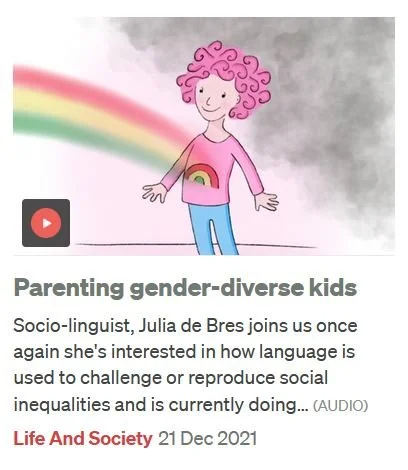The oxymoron of “gender diversity”
Julia De Bres became interested in the subject because she is the mother of a “gender diverse child” herself, and, being a linguist, she was curious about how language is used to advance the interests of gender minorities. The assumption never challenged by the interviewer is that gender as a “deep innate feeling of who you really are” exists. In the interview, de Bres talked about many of the parents going through a mourning period after finding out that their child is “transgender”. But instead of acknowledging the parents’ grief she talked away their - implicitly wrong - “underlying assumptions” in a kind of re-education programme. She wants them to re-arrange their (and by extension, everybody’s) language to get used to the cognitive dissonance* they experience. This is akin to wanting rape victims to re-frame their trauma so they’re able to accept male therapists – as happened at the Edinburgh Rape Crisis Centre. In other contexts, this approach, which is central to identity ideology, is called abusive manipulation.
Not wanting to be outdone, Brian Crump revealed how quickly he got used to the pronoun “they” as a singular, which, according to de Bres, has been used as a gender neutral pronoun since the 14th century^. De Bres: [The language of gender diversity] “poses a real challenge for people who want to uphold the gender binary of just men and just women. That system serves the interests of those people who fit into those categories and want to maintain the current gender system. I don’t subscribe to that view.”
De Bres does not “believe” the evidence supports that there are only two sexes - without providing any evidence to the contrary. Besides being blunt science denial, this is classic gaslighting. It claims that sex binary is not a fact. It implies people who know that the sex binary is a fact are somehow a bit dim and unable to keep up with the times. But no matter how often the binary of human biology is denied, it doesn’t turn it into a spectrum, and it doesn’t magically create anything in between male and female.
The notion of a perpetually changing “gender system” that has just arrived at its “current” state, one we can choose to “subscribe to” or not, is simply ridiculous. What we are talking about here are millions of years of evolutionary development of the human species.
One of de Bres’ aims is to de-pathologise and normalise the phenomenon of “gender diversity”. She says, there’s “nothing wrong with the kid, what’s wrong is the more oppressive social environment. That’s what leads to the psychological distress.” Here, transgenderism is again riding on the coattails of homosexuality. Nothing wrong with gays and lesbians, it’s the bigotted people around them. But same-sex attracted people do not need the pharmaceutical industry to create them. They don’t even need other people to recognise and affirm them to be “valid”.
Some of the more annoying unsupported claims de Bres repeated are the constant “erasure” of “transgender” kids through language, the overwhelming suffering, and that “gender diverse” children have problems accessing medical care. Echoing Dr Elizabeth Kerekere, Dr De Bres also repeated the claim of the “rich history of gender diversity” in Aotearoa and the Pacific that “always existed”, the many “different identities, male, female, and everything in between.” There is scant evidence for all of this. In the interview, de Bres did not elaborate on what it is that is supposedly “in between”. However, she does attempt to do this in a short opinion piece on the Massey University website.
Julia de Bres is yet another academic who wants us to believe that sex is “assigned at birth”, instead of observed and recorded. Being a linguist, her language to describe and explain language seems quite the unreflected repetition of identity ideology’s parlance. And remaining true to the tenets of applied postmodern theory, the discourse analyst turns facts on their heads, denying reality by saying “it’s a discourse that there’s only two sexes”. It’s just an “ideological battle”. If she wasn’t an academic who should know better, it could be seen as tragic that she really seems to believe this.
* We experience a mild form of “cognitive dissonance” every day. It is what we feel when our beliefs are in conflict with each other. For example when we know something we like very much is bad for us, like sweets, alcohol, or tobacco. That knowledge might be worrying, so we bend our mind to find excuses why we consume these things anyway. Cognitive dissonance can also be quite severe and very distressing. For example, when referring to a male by a female name and pronouns, we have to temporarily or permanently “switch off” the truth we know and see, which can be damaging to your notion of reality.
^ We would love to see evidence for the veracity of this claim. Let us know if you come across anything we might have overlooked. And no, the link to a Merriam Webster page that links to a Grammarly blog that links to GLSEN (you know, the GLSEN funded by ARCUS and the Billionaires) does not prove anything.
